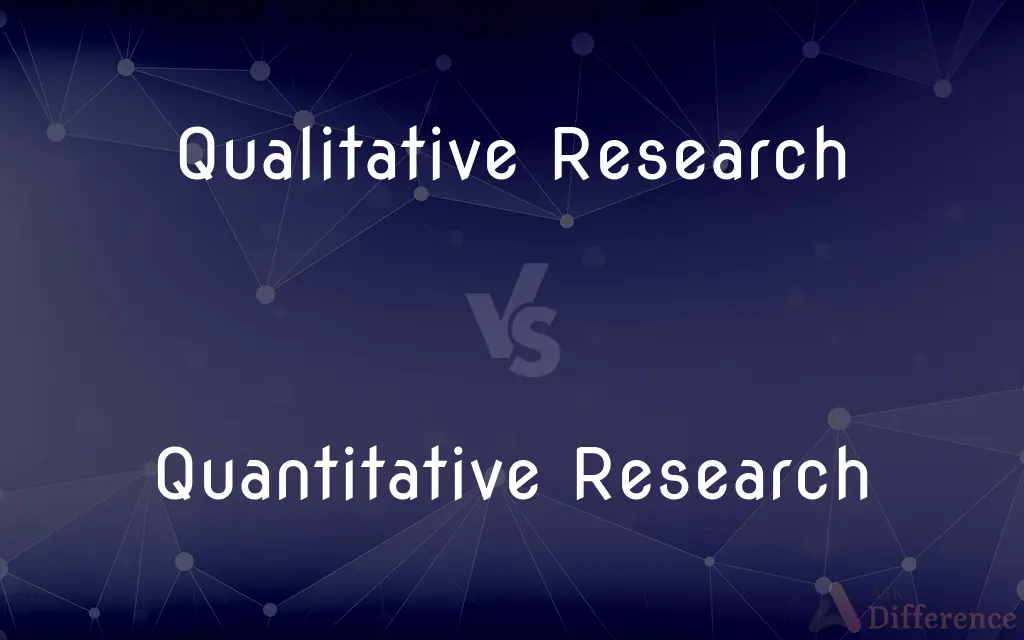Qualitative Research vs. Quantitative Research — What's the Difference?
By Tayyaba Rehman & Fiza Rafique — Published on October 4, 2023
Qualitative Research explores subjective experiences and interpretations, while Quantitative Research focuses on numerical data and statistical analysis.

Difference Between Qualitative Research and Quantitative Research
Table of Contents
ADVERTISEMENT
Key Differences
Qualitative Research seeks to understand human behavior, motivations, and emotions. This approach delves deep into personal experiences, often using open-ended questions. On the contrary, Quantitative Research is more structured, aiming to gather numerical data which can be statistically analyzed.
Qualitative Research methods include interviews, focus groups, and observations, capturing the richness and complexity of human experiences. In contrast, Quantitative Research employs surveys, experiments, and questionnaires, producing data that can be represented by numbers and graphs.
While Qualitative Research thrives on open-ended questions and subjective interpretations, Quantitative Research utilizes closed-ended questions, leading to precise, measurable outcomes. These differences reflect the nature of the two methods: one is exploratory and in-depth, the other is definitive and generalizable.
Qualitative Research emphasizes understanding the 'why' behind behaviors and decisions. It strives for depth over breadth. Quantitative Research, in comparison, prioritizes measuring and quantifying aspects of a population, often drawing conclusions about larger groups based on the data.
In essence, Qualitative Research provides rich, descriptive data, painting a comprehensive picture of individual experiences. Quantitative Research, however, offers concrete numerical data, permitting broader generalizations backed by statistical validity.
ADVERTISEMENT
Comparison Chart
Nature of Data
Subjective and descriptive
Objective and numerical
Methods
Interviews, focus groups, observations
Surveys, experiments, questionnaires
Purpose
Understand human behavior, motivations, emotions
Measure and quantify data for generalization
Type of Questions
Open-ended
Closed-ended
Outcome
Rich, in-depth insights
Precise, measurable results
Compare with Definitions
Qualitative Research
Exploration of human behaviors and emotions.
Through Qualitative Research, they gained insights into consumer preferences.
Quantitative Research
Collection and statistical analysis of numerical data.
Their Quantitative Research showed a 20% increase in sales.
Qualitative Research
In-depth investigation using open-ended questions.
Their Qualitative Research revealed the reasons behind the decline in sales.
Quantitative Research
Research focused on numbers and generalizable findings.
Their Quantitative Research led to actionable insights for the company.
Qualitative Research
Non-numerical data collection for comprehensive understanding.
The Qualitative Research highlighted cultural nuances in the market.
Quantitative Research
Emphasis on measurement and quantification.
The Quantitative Research helped in making data-driven decisions.
Qualitative Research
Study of subjective experiences and interpretations.
The team used Qualitative Research to explore patient satisfaction.
Quantitative Research
Objective research method producing measurable results.
The Quantitative Research indicated significant differences between the groups.
Qualitative Research
Emphasis on understanding the 'why' behind behaviors.
Qualitative Research helped them understand the motivations of their users.
Quantitative Research
Study involving structured surveys and experiments.
Through Quantitative Research, they assessed the product's market demand.
Common Curiosities
Are the results of Quantitative Research generalizable?
Yes, Quantitative Research often allows for broader generalizations due to its statistical nature.
How does Quantitative Research differ in terms of data?
Quantitative Research focuses on collecting objective, numerical data and analyzing it statistically.
What is the main goal of Qualitative Research?
Qualitative Research aims to understand human behaviors, motivations, and emotions in-depth.
Can Qualitative Research be used for large populations?
While possible, Qualitative Research is typically more suited for smaller, focused groups to gain deeper insights.
What are common methods in Quantitative Research?
Common methods include surveys, experiments, and structured questionnaires.
Are the results of Quantitative Research always definitive?
While more definitive than Qualitative Research, there's always some level of uncertainty due to sampling and other errors.
Which research method is more subjective: Qualitative or Quantitative?
Qualitative Research is more subjective, focusing on individual experiences and interpretations.
Is Quantitative Research always based on large sample sizes?
Not always, but larger samples enhance its accuracy and generalizability.
Which type of research provides more descriptive data?
Qualitative Research provides rich, descriptive data on individual experiences.
Which research type typically involves more open-ended questions?
Qualitative Research often uses open-ended questions for exploratory purposes.
Can a research study combine both Qualitative and Quantitative methods?
Yes, this approach is known as mixed methods research.
Why might a researcher choose Qualitative Research?
To gain a deeper understanding of an issue, explore nuances, or uncover the 'why' behind behaviors.
Are observations a part of Qualitative Research?
Yes, observations are a common method in Qualitative Research to study behaviors in natural settings.
Is statistical software more relevant for Qualitative or Quantitative Research?
It's more relevant for Quantitative Research due to the need for numerical data analysis.
Can Quantitative Research explore human emotions?
While it can measure certain aspects, it lacks the depth and nuance that Qualitative Research offers in this area.
Share Your Discovery

Previous Comparison
Mark vs. Score
Next Comparison
Corporate Governance vs. Corporate ManagementAuthor Spotlight
Written by
Tayyaba RehmanTayyaba Rehman is a distinguished writer, currently serving as a primary contributor to askdifference.com. As a researcher in semantics and etymology, Tayyaba's passion for the complexity of languages and their distinctions has found a perfect home on the platform. Tayyaba delves into the intricacies of language, distinguishing between commonly confused words and phrases, thereby providing clarity for readers worldwide.
Co-written by
Fiza RafiqueFiza Rafique is a skilled content writer at AskDifference.com, where she meticulously refines and enhances written pieces. Drawing from her vast editorial expertise, Fiza ensures clarity, accuracy, and precision in every article. Passionate about language, she continually seeks to elevate the quality of content for readers worldwide.












































